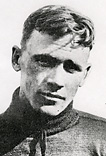 Gene Walker was described in motorcycle magazines of the day as the most talented flat track racer of his time. It is easy to argue in favor of that point of view, since Walker won 19 national championships in his 10 years of professional racing before he died at the peak of his career.
Gene Walker was described in motorcycle magazines of the day as the most talented flat track racer of his time. It is easy to argue in favor of that point of view, since Walker won 19 national championships in his 10 years of professional racing before he died at the peak of his career.
While practicing alone on a track in Stroudsburg, Pennsylvania, on June 7, 1924, Walker crashed for an unknown reason. While no one saw the accident that killed Walker, those on the scene speculated that he may have hit a tractor that was parked on the side of the track. He lived for two weeks after the crash, but died in Rosenkrans Hospital in East Stroudsburg, Pennsylvania, on June 21.
Walker was the first nationally known rider to emerge from the South. Born Eugene Walker on November 7, 1893, in Birmingham, Alabama, the young Walker purchased a second-hand motorcycle when he was 17. He soon became proficient in maneuvering the motorcycle at a rapid pace. He then bought a brand new Indian.
Getting a job as a postal delivery person, Walker was one of the first in Birmingham to use his motorcycle for delivering mail. Riding his machine everyday, Walker honed his skills as a rider. At the 1912 Alabama State Fair, a motorcycle race was held and drew a good crowd. Walker entered the race and won the five-mile final.
Having tasted the joy of victory in competition, Walker became more deeply involved in motorcycling. He left his job at the Post Office to go to work for a Birmingham Indian dealer named Bob Stubbs. Stubbs was a racing enthusiast and Walker happily found himself surrounded by a racing atmosphere. During this time, it was customary for many of the top riders in the country to make Birmingham a temporary headquarters during the fall of the year. Walker gained considerable knowledge learning from top-notch riders like Joe Wolters and Ray Creviston, and turned pro in 1914.
During the winter of 1914, Walker went to Indian headquarters in Springfield, Massachusetts, to work in the testing room. Again, he gained valuable firsthand experience about the inner workings of the Indian factory racing machines.
Walker's first big national win came at the 1915 FAM meeting on July 10 in Saratoga, New York. Walker won the five-mile championship over Bob Perry, Jim Davis, Red Parkhurst and other top riders, establishing a new record for the distance in the process. Walker continued to earn impressive results in the country's most popular races, such as the Dodge City (Kansas) 300, where he finished fifth in 1916. Then World War I put a damper on Walker's fast-rising notoriety.
1919 was a breakthrough year for Walker. That season he won six of the 13 national championship races. He also set three new track records during the year. Going into the 1920s, Walker was declared Champion of Champions by Motorcycle and Bicycle Illustrated.
In the 1920s, Walker continued to win championships and break records all across the country on both the boards and dirt tracks. His final title was five-mile championship on the boards won in Los Angeles, California, on February 17, 1924.
Walker primarily rode for Indian except on a few occasions when racing bikes from the Wigwam were not available. Walker was known for his sportsmanship and is credited with being the first well-known rider to ride with his foot down through the turns. Before Walker came along, it was considered cowardly to put down a foot even in the biggest slides.
Walker was a mentor to many younger racers in the early 1920s. Johnny Seymour claimed that Walker was like a father to him, always watching out for his best interests. Walker was known to share his earnings with his mother in Birmingham. Always a proponent of safety, Walker consistently implored his fellow competitors to ride carefully. In one highly-publicized incident, Walker refused to compete in a race in Huntington, West Virginia, due to the dusty conditions. He favored the high speeds of the boards and mile-long circuits.
After his untimely death, the Morning Press newspaper of East Stroudsburg, Pennsylvania, generously inaugurated a benefit on behalf of Walker's widow and two children. The benefit was strongly supported by the motorcycling fraternity.
Inducted in 1998